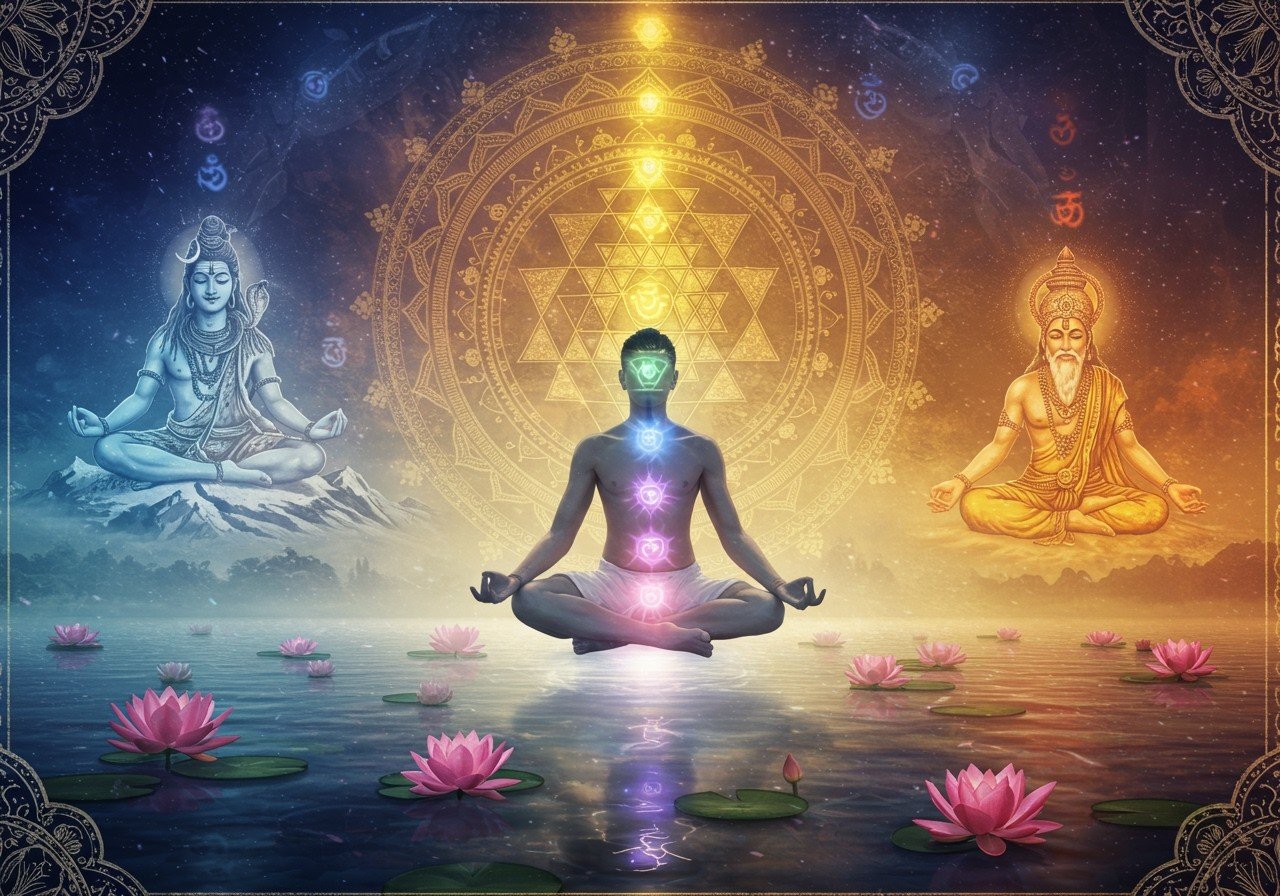Connecting with Your Inner Self: A Hindu Philosophy Guide

In Indian culture, Yoga and Hindu Philosophy share a profound connection, dating back centuries. Both are integral to spiritual practices and understanding within Hindu traditions. This connection provides valuable insights for those seeking traditional spirituality. For individuals rooted in culture, Yoga offers a practical way to enhance their spiritual journey while honoring their beliefs.
Hindu Philosophy and Yoga: An Inseparable Link
Hindu Philosophy revolves around core concepts like Dharma, Karma, and Moksha. Yoga is instrumental in achieving spiritual liberation (Moksha). Six major schools of thought exist within Hindu Philosophy, including Vedanta, Samkhya, and Mimamsa, each with its own interpretation of Yoga. The Bhagavad Gita, a cornerstone text, connects Yoga with Hindu Philosophy, illustrating how Yoga creates harmony between body, mind, and spirit, ultimately leading to self-realization. These philosophical concepts deeply influence cultural values and shape contemporary Yoga practices, both in India and globally.
The Spiritual Path of Yoga in Hindu Philosophy
Yoga, a deeply spiritual practice, holds a significant place in Hindu philosophy. Firmly rooted in ancient traditions, Yoga is a pathway to self-awareness and liberation. It transcends mere physical exercise, representing a journey of the soul towards divine union.
The Road to Liberation
In Hindu philosophy, Yoga’s purpose is to unite the human spirit with the divine. This union, known as Moksha or Kaivalya, signifies freedom from ignorance and worldly attachments. Through Yoga, individuals seek to overcome ignorance through self-awareness, knowledge, and discriminative discernment. The Bhagavad Gita introduces three key paths of Yoga:
- Karma Yoga (the yoga of action): This path emphasizes selfless action and performing one’s duties without attachment to results. It encourages individuals to act with integrity and dedication, focusing on the process rather than the outcome.
- Bhakti Yoga (the yoga of devotion): Centered around love and devotion to God, this path fosters a personal connection with the divine. It involves practices like prayer, chanting, and rituals, deepening the practitioner’s relationship with the divine.
- Jnana Yoga (the yoga of knowledge): This path emphasizes deep contemplation and study to distinguish the true self from the illusionary self. It encourages self-inquiry and the pursuit of wisdom to attain liberation.
These distinct paths offer unique insights and experiences, guiding individuals on their spiritual journey.
Understanding Mind and Matter
Yoga philosophy explores the nature of mind and matter through the concept of *gunas* – inherent qualities or tendencies. It explains that *Purusa* (pure consciousness) is characterized by *sattva* (purity and harmony), while *Prakriti* (matter) is associated with *tamas* (inertia and chaos). Yoga helps cultivate *sattva*, promoting mental clarity and spiritual insight. This understanding is fundamental to achieving balance and harmony.
Ethics and Liberation
Ethical conduct is paramount in Yoga philosophy, defined by *Yamas* (restraints) and *Niyama* (observances). These principles promote self-control and virtuous living, forming the foundation for spiritual growth. Both Yoga and Samkhya schools believe that liberation is achieved through insight and self-discipline. In Yoga, this liberation is termed “Kaivalya,” marking the end of bondage. This state is attained through consistent practice and adherence to ethical principles.
The Enduring Influence of Patanjali’s Yoga Sutras
Compiled around 400 BC, Patanjali’s Yoga Sutras are fundamental to Yoga philosophy. They introduce Ashtanga Yoga, an eight-fold path encompassing ethical principles, physical postures (asanas), breath control (pranayama), and meditation. Hatha Yoga later emerged, integrating these teachings with poses and breathing exercises, eventually evolving into modern Yoga. It is important to note that these Sutras are a foundational text.
The fusion of ancient wisdom and modern practices showcases the rich tapestry of Yoga within Hindu philosophy. This tradition inspires people globally, offering a timeless journey towards spiritual fulfillment. Embrace this journey with respect and curiosity, delving into the depths of Yoga and its profound connection to Hindu philosophy.
How Poojn.in Enhances Your Spiritual Journey
Poojn.in offers a curated selection of products to support your exploration of Hindu philosophy and Yoga practice. For meditation and yoga, we provide Tulsi malas and Rudraksha malas crafted from traditional materials. These malas can enhance your focus and connection during spiritual practices. Our collection of Ganesha idols and other divine forms, made from brass and copper, can serve as focal points for your devotion. We also offer authentic religious texts, including various editions of the Bhagavad Gita, Upanishads, and yoga philosophy books, providing valuable resources for deeper understanding.
Explore our collection of spiritual products at Poojn.in.
FAQs: Hindu Philosophy and Yoga Explained
What links Hindu Philosophy and Yoga? Hindu philosophy and yoga share a deep connection, with yoga being one of the six orthodox schools of Hindu philosophy. Yoga provides the practical tools for spiritual growth within the framework of Hindu philosophical concepts.
How does Jnana Yoga relate to Moksha? Jnana Yoga, the path of knowledge, is crucial for attaining Moksha (liberation) in Hindu philosophy. It emphasizes self-realization through understanding and wisdom.
What is Bhakti Yoga’s role in Moksha? Bhakti Yoga, the path of devotion, offers another route to Moksha. It emphasizes love and devotion to a chosen deity as a means of spiritual liberation.
Can anyone practice Yoga according to Hindu philosophy? Yes, Hindu philosophy embraces inclusivity, welcoming anyone seeking spiritual growth through Yoga, regardless of background.
Why is meditation vital in Yoga and Hindu philosophy? Meditation calms the mind, fostering self-awareness, essential for spiritual progress in both Yoga and Hindu philosophy.
How do Yoga principles align with Hindu teachings? Yoga principles, including non-violence, truthfulness, and self-discipline, are deeply rooted in Hindu teachings, promoting a harmonious life.
Is Yoga just about physical postures in Hindu philosophy? No, Yoga is a holistic practice encompassing physical postures, meditation, ethical conduct, and mental discipline for overall spiritual development.
What are the different Yoga paths in Hindu philosophy? Hindu philosophy outlines various Yoga paths, including Jnana Yoga (knowledge), Bhakti Yoga (devotion), Karma Yoga (action), and Raja Yoga (meditation), each offering a unique approach to spiritual growth.
For further exploration on related topics, you can visit these insightful articles:
- Connecting With Your Inner Self: A Hindu Philosophy Guide
- Beyond the Temple: India’s Spiritual Heart Revealed
- Vedas: Ancient Wisdom for Modern Life – Practical Applications
- Yoga & Ayurveda: A Holistic Wellbeing Approach
- Mantra Chanting: Sound, Vibration & Healing Power


